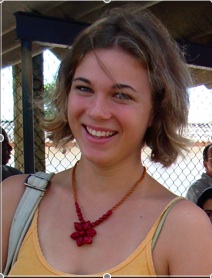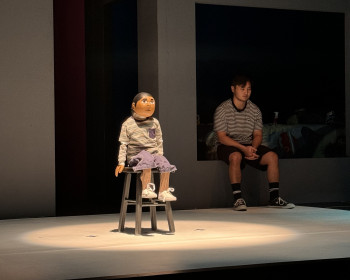Discussion of immigration has long been highly politicized and in America, often devolves into debate about Mexican immigration to the United States. A group of Lewis & Clark students are asking people to reconsider their understanding of immigration and its effects on the country. The Ray Warren Multicultural Symposium, Landscapes of Migration, will focus on why people migrate, how it affects culture and identity, and the socio-political issues tied to migration.
This symposium is one of four organized by undergraduate students at Lewis & Clark annually addressing a cross-section of social and political issues. The 2008 Multicultural Symposium is chaired by students Myriah Heddens ‘09, Callie Mae Riley ’10, and Maile Speakman ’10 and directed by Kimberly Brodkin, visiting professor of humanities. Here, the student organizers address their personal and academic interests in the politics of migration.
What is the distinction between migration and immigration?
Maile: The difference between migration and immigration in my mind is the connotation of the word “immigration” in our society. When politicians or the media discuss immigration they usually are referring to Mexican migration to the United States. I believe that the word has become highly politicized and does not reflect the multiple immigration experiences that people from all over the world have who have come to live in the United States. Migration, on the other hand, is a more general term that has not been used in political rhetoric and can be used to represent a variety of experiences without a particular connotation.
Myriah: Although I am not sure there is much of a technical difference between migration and immigration, immigration is a heavily loaded term. I think that popular American culture and media have stigmatized the term immigration and immigrant, associating immigration and immigrants with challenging—generally in a negative way—what I see as an ethno-centric and patriarchal construction of the United States and what it means to be an American. I see the next major civil rights struggle in this country occurring between Americans who possess deep nativist sentiment and immigrants.
Migration will likely conjure up the politics of the U.S./Mexico border and immigration. Do you hope people will take something more or different away after attending the symposium?
Andrew: I really do. My research has focused primarily on Hmong migration to the United States as refugees from South East Asia. There is such a dearth of discussion of South Eeast Asian migration following the Vietnam War, post-1989 migration from former Soviet bloc countries; I am hoping that the symposium shows students the diversity in migrating populations.
Maile: Definitely. Currently my friend Brenda Salas Neves and I are working on a “Migration to Oregon” panel and the first speaker we approached for the panel was Kayse Jama who is a Somalian migrant and the executive director of the Center for Intercultural Organizing. I hope that when people hear stories from people like Kayse they will remember that migration to the United States comes from a multitude of places.
Myriah: We have dedicated a lot of energy to ensuring that this symposium is more than a dialogue about U.S-Mexico border relations. While Mexican migration certainly receives the bulk of the media’s attention and political criticism, migration to and within the United States is much more complex and diverse. We have gathered panelists and keynote speakers who will speak about migration more generally and theoretically, as well as integrate discussions on migration from West Africa, South East Asia, Central America, Europe and the Middle East.
What speaker or panel session are you particularly looking forward to?
Andrew: Kao Kalia Yang. She is a Hmong author who has written about her family’s experience living in the jungles of Laos and then fleeing Pathet Lao persecution, first by going to refugee camps in Thailand and later resettling in the United States. Her book, The Latehomecomer, is incredible.
Myriah: We will hold a panel on family and immigration and I am really looking forward to hearing Professor Juliet Stumpf from the law school speak about the convergence of criminal and immigration law, Immigration Control and Enforcement (ICE) raids, and the impacts on immigrant families here in Portland. Oregon is a large immigrant-receiving state and we have worked hard on making at least two panels that will talk about migration more locally.
Have you taken a class (or done coursework) that you’ve found useful in planning the symposium?
Andrew: Absolutely. For my qualitative research methods course in the Sociology/Anthropolgy department, I began the study I am currently working on, looking at cultural identity in refugee migration, concentrating on the Hmong. I have sort of continued the theme in different ways throughout other Sociology/Anthropology courses.
Maile: Yes. I took a class taught by Elliott Young called U.S.-Mexico Borderlands and through that class had the chance to go on an alternative spring break trip to Oaxaca to study migration routes from Oaxaca to Oregon. I continued this work with Elliott this summer as his research assistant and I was able to assist in organizing a conference called the Tepoztlán Institute for the Transnational History of the Americas in Mexico. Seeing how a professional conference was organized around themes of transnationalism and migration really helped me get an idea of how to best organize our symposium this year.
Learn more about the 5th Annual Multicultural Symposium and keynote speakers.


